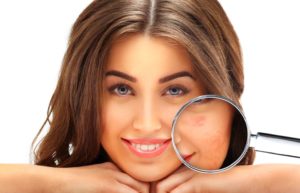No matter how old you are, acne can make an appearance. For some people, it decreases after puberty, but for others, it remains a lifelong problem. Acne treatments can dramatically improve your acne and confidence. Clear skin lets you feel more self-assured and ready to face the world.
What Causes Acne?
Acne occurs when oil glands or hair follicles become filled with oil, dead cells, and other debris. Bacteria that usually live on the skin can take advantage of these clogged pores. Picking or squeezing blemishes can introduce these bacteria deeper into the skin. Avoid interfering with your acne to prevent discomfort and scarring.
Acne has a strong genetic component. Hormones also have a strong influence, causing acne to appear in puberty and often reappear during hormonal changes such as menstrual cycles and menopause. Heavy or oil-containing skin and hair products can worsen acne problems. High carbohydrate diets may worsen acne but research is still ongoing.

What Treatments are Available for Acne?
At-home treatments can resolve many cases of mild acne. A good at-home routine will boost any other treatments you may have. Your Krauss Dermatology professional will often recommend a face wash with salicylic acid to start (such as Neutrogena Acne Wash or Cerave SA Cleanser), followed by over-the-counter or prescription topical medications. Over the counter topical medications to start with include benzoyl peroxide (Paula’s Choice daily clearing or Neutrogena On the Spot) and retinoids (Differin Gel Acne Treatment).
Beware benzoyl peroxide can bleach your towels and pillow cases (use white ones) and retinoids should be started every other night increasing only as tolerated. Stronger topical medications as well as different topical options for sensitive skins are available by prescription only.
Oral medications may work if other methods do not. These may include hormonal treatments (oral contraceptives, spironolactone), antibiotics (such as Doxycycline), or an oral retinoid (Isotretinoin also known as Accutane). Only a doctor can prescribe these medications, so consult a dermatologist if you have not had success with other treatments.
Are There Side Effects with Acne Treatments?
Topical and oral retinoids make your skin highly sensitive to the sun. You will need consistent SPF protection at all times. We can recommend an oil-free sunscreen that does not trigger acne (non-comedogenic). Your dermatologist will discuss other possible side effects including irritation and dryness. Most side effects are mild and will resolve when you stop using the medication or by adding proper emollients/moisturizers.
Am I a Good Candidate for Acne Treatment?
Anyone struggling to manage their acne alone should seek help from a dermatologist. You are a good candidate for treatment if you understand that this trial-and-error process may take time to find the ideal combination. Certain medical conditions might keep you from being a good candidate for some medications.
Can I Remove My Acne Scars?
Acne can leave scars, especially if you have deep cystic acne. These scars often look like pits or indentations in the skin. Your Krauss dermatologist may recommend laser treatments to smooth and firm the skin for a more even appearance. Dermal fillers, microneedling or a surgical procedure called subcision may also help. Acne scarring is extremely difficult to improve, may take multiple treatments, and in some cases may persist despite multiple attempts and modalities utilized. The best acne scar treatment is to aggressively treat acne before it scars.
Take the Next Step
If you have further questions about acne treatments, we encourage you to schedule a consultation at Krauss Dermatology. Call us at (781) 416-3500 or fill out our online contact form. We look forward to taking care of you.

